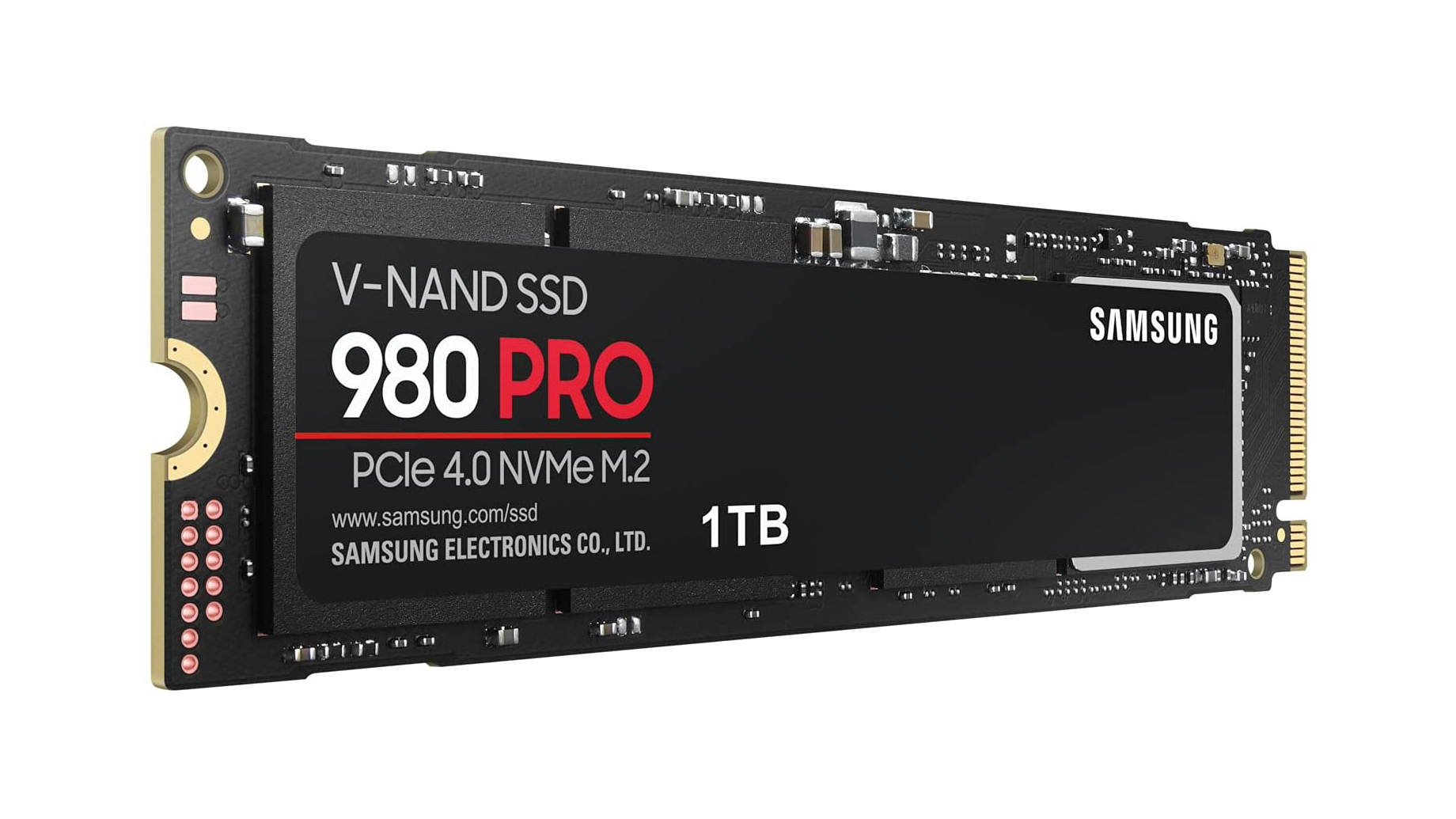Samsung 980 Pro review: Smashing speeds
Staggering performance and handy extras make this a worthy contender


-
+
Outstanding speeds across the board
-
+
High endurance rating
-
+
Strong encryption features
-
-
No bundled cloning software
-
-
Expensive

If you want to read and write files at top speed, you need an NVMe SSD. Older SATA drives are fine for everyday computing, but the technical limitations of the bus itself mean they can’t go much faster than around 530MB/sec. By contrast, NVMe uses a PCI Express x4 connection, which allows data to be transferred at much higher rates.
The Samsung 980 Pro takes full advantage of this. Plug it into a PC or laptop with a PCI Express Gen3 motherboard and it’ll deliver super-fast file transfers, hitting the maximum speed that the interface can handle – around 3GB/sec in each direction.
And on systems with the latest PCI Express Gen4 bus, the drive can go even higher. We tested the 980 Pro in a 2021 desktop PC based on an Asus Strix B550-F motherboard, and looked on in awe at the performance we got. With the drive formatted as NTFS, sequential files were loaded at an incredible 5,468MB/sec. Write speeds got a serious lift too, averaging 3,944MB/sec. For random-access operations, the 980 Pro averaged a still very creditable read speed of 2,880MB/sec, and a write speed of 3,687MB/sec.
These numbers translate to first-class real-world performance. Windows feels phenomenally snappy, and when you launch an application it typically leaps up in seconds. The PCMark 10 benchmark gave the 980 Pro an excellent system disk score of 2,977 – one of the fastest performances we’ve seen, beaten only by WD’s Black SN850 SSD.
The 980 Pro works brilliantly as a data drive too, though we doubt many people are buying this high-end SSD solely for file storage. All capacities come with a five-year warranty, and Samsung cites a write endurance of 600TBW per terabyte of storage. This means you can write and rewrite a huge amount of data before the memory cells are at serious risk of degrading: it might not do for a database server, but it’s more than fine for a workstation.
Like most NVMe SSDs, the 980 Pro comes as a bare board that plugs into a standard 80mm M.2 slot. But while the look may be basic, it comes with a reasonable set of extra features. For one thing, it has built-in 256-bit AES encryption, with support for the Opal and IEEE-1667 standards – reassuring for IT managers who need to worry about sensitive data falling into the wrong hands.
This can be configured from the Samsung Magician software, which also lets you monitor technical data and run benchmarks to check the health and performance of your drive. Just note that, unlike some SSDs, this model doesn’t come with any cloning software to aid installation.
A high-end drive like this doesn’t come cheap, though. The entry-level 250GB model costs around £59 exc VAT, with 500GB, 1TB and 2TB variants progressively increasing in price to a rather steep £288 exc VAT. The 1TB model on test works out to a rather precipitous 19p per GB, so you can save a lot of money by choosing a more cost-effective drive like the WD Blue SN550.
However, if you need top performance and hardware encryption, the Samsung 980 Pro fully delivers on both: if you’ve got the cash, it’s one of the most impressive SSDs around.
Samsung 980 Pro specifications
| Capacity | 1TB |
| Cost Per Gigabyte | 19p |
| Interface | NVMe |
| Claimed Read | 7,000MB/sec |
| Claimed Write | 5,000MB/sec |
| Warranty | 5yr |
Get the ITPro daily newsletter
Sign up today and you will receive a free copy of our Future Focus 2025 report - the leading guidance on AI, cybersecurity and other IT challenges as per 700+ senior executives
Darien began his IT career in the 1990s as a systems engineer, later becoming an IT project manager. His formative experiences included upgrading a major multinational from token-ring networking to Ethernet, and migrating a travelling sales force from Windows 3.1 to Windows 95.
He subsequently spent some years acting as a one-man IT department for a small publishing company, before moving into journalism himself. He is now a regular contributor to IT Pro, specialising in networking and security, and serves as associate editor of PC Pro magazine with particular responsibility for business reviews and features.
You can email Darien at darien@pcpro.co.uk, or follow him on Twitter at @dariengs.
-
 Nvidia braces for a $5.5 billion hit as tariffs reach the semiconductor industry
Nvidia braces for a $5.5 billion hit as tariffs reach the semiconductor industryNews The chipmaker says its H20 chips need a special license as its share price plummets
By Bobby Hellard Published
-
 Business leaders are having a crisis of confidence over data literacy
Business leaders are having a crisis of confidence over data literacyNews A Salesforce survey reveals business leaders don't trust their data, or their ability to make the most of it
By Emma Woollacott Published
-
 MITRE CVE program handed last minute reprieve amid funding lapse concerns
MITRE CVE program handed last minute reprieve amid funding lapse concernsNews The MITRE Corporation's Common Vulnerabilities and Exposures (CVEs) database has been handed a last minute reprieve amid concerns over funding.
By Rory Bathgate Last updated